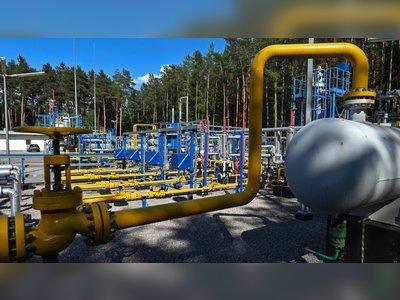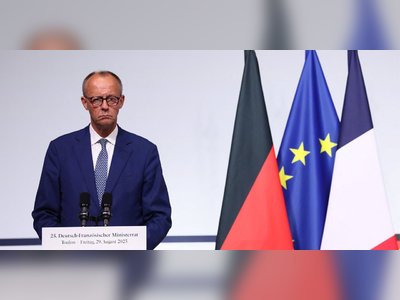0:00
0:00
Germany's Election Results: Migrants Face Uncertainty Amid Rising Far-Right Support
As the Alternative for Germany party gains traction, immigrants express concerns over economic instability and social acceptance.
In Germany, recent election results have revealed a notable increase in support for the anti-immigration Alternative for Germany (AfD) party, raising concerns among immigrants regarding their future in the country.
The topic of asylum policy was central to this year's campaign, with the AfD securing a significant share of the vote, along with other conservative parties.
Mohammad Azmouz, a 57-year-old Syrian barber in Berlin, described casting his first vote in Germany as an indescribable experience, yet voiced anxiety over the rising hostility toward immigrants.
He questioned the societal perception of migrants, stating, "Why this hatred?
We work, and we established ourselves.
We are not a burden on society, so why this hatred?
We love the German people." Economic instability has been a pressing issue, with rising living costs aggravating the situation for many.
In light of these challenges, Azmouz cast his vote for Die Linke, a far-left party advocating for social justice and support for low-income households.
Reflecting on the changes since Angela Merkel's tenure as chancellor, he noted a deterioration in conditions for residents.
A study conducted by DeZIM has indicated that 63.4% of Germans with immigrant backgrounds are concerned about their economic situation, which significantly contrasts with the 46.7% of non-immigrants expressing similar concerns.
The number of migrants in Germany has reached historic levels, with over seven million individuals now eligible to vote, a demographic that includes many former refugees.
Views among migrants regarding political support are varied.
Mohammed, a Jordanian barber without voting rights, articulated support for the AfD, emphasizing the need for stricter immigration policies and border security.
He remarked, "If there were an AfD party in my country, I would vote for it." Historically, the Social Democrats (SPD) have enjoyed popularity among migrant communities due to their focus on workers' rights and social welfare.
However, this election cycle has seen a significant decline in their support.
Alaa Eddin Mhanna, a Syrian plant operator near Berlin, noted a shift in his voting preference; he previously supported the SPD but was disheartened by their stance on the Ukraine conflict, which he argues negatively impacts Germany’s economy.
Mhanna expressed dissatisfaction with the political landscape, stating, "No party truly represents me," while emphasizing economic concerns as paramount in the electoral outcome.
His comments highlight worries about the potential for conservative parties forming coalitions with the AfD, despite assurances that it may not occur.
Azmouz shared aspirations for the newly elected leaders, hoping that Friedrich Merz of the Christian Democratic Union (CDU) would foster a compassionate governance approach benefiting all residents, including refugees.
He expressed a desire for the incoming administration to exhibit mercy toward all citizens.
The topic of asylum policy was central to this year's campaign, with the AfD securing a significant share of the vote, along with other conservative parties.
Mohammad Azmouz, a 57-year-old Syrian barber in Berlin, described casting his first vote in Germany as an indescribable experience, yet voiced anxiety over the rising hostility toward immigrants.
He questioned the societal perception of migrants, stating, "Why this hatred?
We work, and we established ourselves.
We are not a burden on society, so why this hatred?
We love the German people." Economic instability has been a pressing issue, with rising living costs aggravating the situation for many.
In light of these challenges, Azmouz cast his vote for Die Linke, a far-left party advocating for social justice and support for low-income households.
Reflecting on the changes since Angela Merkel's tenure as chancellor, he noted a deterioration in conditions for residents.
A study conducted by DeZIM has indicated that 63.4% of Germans with immigrant backgrounds are concerned about their economic situation, which significantly contrasts with the 46.7% of non-immigrants expressing similar concerns.
The number of migrants in Germany has reached historic levels, with over seven million individuals now eligible to vote, a demographic that includes many former refugees.
Views among migrants regarding political support are varied.
Mohammed, a Jordanian barber without voting rights, articulated support for the AfD, emphasizing the need for stricter immigration policies and border security.
He remarked, "If there were an AfD party in my country, I would vote for it." Historically, the Social Democrats (SPD) have enjoyed popularity among migrant communities due to their focus on workers' rights and social welfare.
However, this election cycle has seen a significant decline in their support.
Alaa Eddin Mhanna, a Syrian plant operator near Berlin, noted a shift in his voting preference; he previously supported the SPD but was disheartened by their stance on the Ukraine conflict, which he argues negatively impacts Germany’s economy.
Mhanna expressed dissatisfaction with the political landscape, stating, "No party truly represents me," while emphasizing economic concerns as paramount in the electoral outcome.
His comments highlight worries about the potential for conservative parties forming coalitions with the AfD, despite assurances that it may not occur.
Azmouz shared aspirations for the newly elected leaders, hoping that Friedrich Merz of the Christian Democratic Union (CDU) would foster a compassionate governance approach benefiting all residents, including refugees.
He expressed a desire for the incoming administration to exhibit mercy toward all citizens.
AI Disclaimer: An advanced artificial intelligence (AI) system generated the content of this page on its own. This innovative technology conducts extensive research from a variety of reliable sources, performs rigorous fact-checking and verification, cleans up and balances biased or manipulated content, and presents a minimal factual summary that is just enough yet essential for you to function as an informed and educated citizen. Please keep in mind, however, that this system is an evolving technology, and as a result, the article may contain accidental inaccuracies or errors. We urge you to help us improve our site by reporting any inaccuracies you find using the "Contact Us" link at the bottom of this page. Your helpful feedback helps us improve our system and deliver more precise content. When you find an article of interest here, please look for the full and extensive coverage of this topic in traditional news sources, as they are written by professional journalists that we try to support, not replace. We appreciate your understanding and assistance.











